|
A CONVERSATION WITH HOMO HEIGHTS by Phillip Ward |
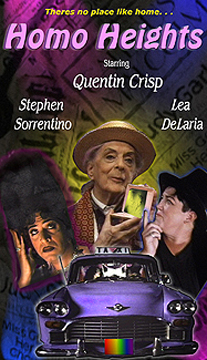 Homo Heights is a hilariously soapy and amusingly offbeat surreal comedy set in a rarefied dream world of drag queen glitter and lovelorn lesbian longing. Variety calls it "camp humor worthy of John Waters meets Dick Tracy-style comic book direction, peppered with an Adventures of Priscilla, Queen of the Desert kind of irreverence. . . ." Homo Heights is a hilariously soapy and amusingly offbeat surreal comedy set in a rarefied dream world of drag queen glitter and lovelorn lesbian longing. Variety calls it "camp humor worthy of John Waters meets Dick Tracy-style comic book direction, peppered with an Adventures of Priscilla, Queen of the Desert kind of irreverence. . . ."Homo Heights, written and directed by Sara Moore and produced by Kate Lehmann, is a feature length narrative film that weaves farce and satire with romance and comedy in a barely fictional community. It is a slice of gay life in cartoon dimensions, with completely recognizable characters and situations pushed to their limits. Heavyweight drag queen and leader of the gay mafia, "The Donna," Maria Callous (Stephen Sorrentino), desperately tries to maintain control of his empire. His companion, resident guru Malcolm (Quentin Crisp), has grown weary of being kept and hungers to be free of the Donna's demands. Lesbian "romeo" Clementine (Lea DeLaria), realizes there could be more to life than one night stands, enthusiasticly assists Malcolm in his escape by rallying assistance from some unlikely sources. Everyone is desperate to find where they belong, where "home" is, and to help their beloved Malcolm get the one thing he wants most, his freedom. Drag queen mobsters, queer newspaper reporters, turkey basters and Toto from Kansas all play a role in Homo Heights. Below is an exclusive interview by Quentin Crisp Archives with Sara Moore, Kate Lehmann, and Stephen Sorrentino. Phillip Ward: How did you first meet or become aware of Quentin Crisp? Kate Lehmann: Like many people in the U.S., I first learned about Mr. Crisp when film adaptation of The Naked Civil Servant was broadcast on public television. I was intrigued and moved by his autobiography and subsequently read the book as well. In addition, I saw him on screen in ORLANDO when that movie came out. Sara Moore: I met Quentin Crisp through Stephen Sorrentino, a mutual friend. Stephen Sorrentino: The Naked Civil Servant on PBS. PW: What kind of effect did meeting Mr. Crisp have on you? KL: I felt very honored to meet him for the first time-in spite of the fact that it was in the middle of a January blizzard in Minneapolis. He emerged from a white limo into the swirling snow wearing an enormous fur hat and proclaimed how delightful it was to arrive at last. We had asked him to come for a kick-off reception for Homo Heights to help launch our fundraising efforts. It was quite a journey as New York City was virtually shut down due to a snowstorm and we had to make sure he was able to get to the airport on his own as Mr. Sorrentino couldn't pick him up as planned. Then he arrived at the airport without identification. Mr. Sorrentino, who met him at the airport, enlisted the support of other 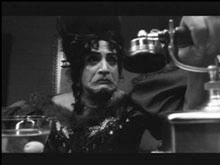 travelers to confirm his identity. Their vouchers plus a piece of mail he had was enough to get him on the plane at last. travelers to confirm his identity. Their vouchers plus a piece of mail he had was enough to get him on the plane at last.By the time I met him, he had been travelling for about 12 hours and, in spite of his exhaustion, he was extraordinarily gracious. The following evening, after the reception, a group of us went to dinner. My brother, an attorney, was pacing around the table and Mr. Crisp turned to me and said, "One should worry when an attorney starts pacing. We should all be gravely concerned." I fell head-over-heels in love with the dear man. SM: Meeting Quentin was a very profound moment. I am a fellow traveler in worlds of my own creation, or at least of traveling in the world as my own creation! I loved him instantly and was mightily jarred by his likeness to the character of Malcolm in the first draft of Homo Heights, a character who seemed to write himself and I had no one in mind to play him up till then. SS: See my essay I wrote for Quentin Crisp Archives: Crisp Star Quality. PW: What was it like working with Quentin Crisp? KL: He was a delight-very professional, very agreeable, and the cast and crew loved working with him. Making movies is a tedious thing, lots of hurry-up and wait, extreme circumstances such as strange hours, heat, and flaring tempers. Mr. Crisp would show up and say, "Where do I stand? What do I say?" SM: Working with Quentin was effortless and filled with humor. He was a gentleman and only required "a beer" on the set. SS: Wonderful. Much like being his friend was. Full of the unpredictable. I did find myself watching over him more because we were out of town. When he asked for a beer during breakfast time I would instruct the craft service people that they had run out of beer until noon. I made sure he was being treated like an elderly man and not just another cast member. The staff at the film were very kind and respectful of him. I made sure that all others were as well, including the press people. PW: Does anyone in pop culture today compare to Quentin Crisp? KL: I can't think of a single person who compares to Mr. Crisp. SM: I would never presume to compare Quentin with anyone! An original, 100 percent. The world felt considerably better with him in it. 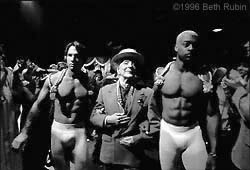 SS: No. Crisp was the last of a dying breed. As he stated in the movie, "Everyone fun is dead!" SS: No. Crisp was the last of a dying breed. As he stated in the movie, "Everyone fun is dead!"PW: Can you offer a favorite memory of Mr. Crisp? KL: Mr. Crisp had the tendency to tell the same stories over and over when he didn't know someone. We were privileged to reach a point with him that we could really have a conversation and have fun with him. I have lots of favorite memories but one that I particularly enjoy was when Sara and I had taken him to the airport after the gala premiere of Homo Heights. We were sitting with him and asked him how he liked the film. He thought for a minute and then announced that his favorite part was the ending. I laughed, not only because of the double entendre, but because it is about his character's disappearance. A man of more ego would hardly have picked that moment as his favorite. SM: Yes, my favorite memory of Quentin is of a day I went to see him at "his cafe" downtown in New York City. He had warned me that he never read scripts and just preferred to appear on set and be told what to do. But as I approached the cafe that day—it was snowing and gorgeous—I was stopped in my tracks seeing Quentin through the window, reading my script through his tiny glass pendant. Every now and then he'd pause and look around, waiting for me to show. I was so honored and stunned that I just stood there under the snowfall watching this dear little man—and icon—reading my words. SS: After filming we went out for dinner, just the two of us. After a good amount of vodka I got Mr. Crisp to pick out the "one's" he found attractive and why so. It was a fun look into his past and private personality he kept for his closer friends. PW: How has Quentin Crisp influenced or changed your life? KL: Mr. Crisp was a genius in many ways. He made his life as he wanted it and, I think, truly believed in loving all people "horizontally." That is to say, equally. He reinforced my own feelings that one shouldn't attempt to be anything other than what one is. He was one of a kind, but each of us is as well. SM: Quentin's appearance in my life seemed all too brief. I wish I'd had more years to be around him. But his impact has been lovely. He starred in my film—magnificently—and managed to give me good British advice on love, which I will always turn to in crisis. SS: My speech at the memorial said it best. (An edited version of Mr. Sorrentino's speech at Mr. Crisp's memorial can be heard on the recording available at Pacifica Radio Archives.) PW: Did you write the part for Quentin in mind? SM: Amazingly, I did not write the part for anyone. As a first generation British American, I had grown up with British parenting and hours of Masterpiece Theatre and anything else the BBC could run on American soil—so the cadence of the Malcolm character's speech was quite natural for me to write. 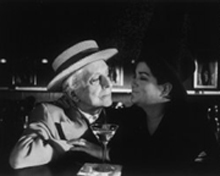 PW: How did the casting process work? Was there an audition? PW: How did the casting process work? Was there an audition?SM: There were several auditions for casting Homo Heights. The idea was to find the right mix for a strong ensemble—the right chemistry. And we did. PW: This is a nice ensemble piece that works well. Was there a lot of rehearsals? How long? SM: Casting well was most of the battle so that's why the ensemble chemistry worked so well. No, we had virtually no rehearsal time at all. A good team with strong backgrounds in theatre sure helped! PW: How did the cast react to Quentin during filming? SM: Quentin was adored during filming and treated like the royalty that he was! PW: What kind of direction did you give Quentin? SM: I directed Quentin as basically as possible. This was a man for whom a cookie recipe, recited, sounded like Shakespeare. No need to meddle with a grand piano! Of course we cue-carded him and in some cases, I would recite the lines off-camera and he would repeat them. Otherwise, he actually read and knew most of the script, for which I was terribly grateful. PW: Was there a scene that was particularly difficult? SM: Quentin himself was absolutely never difficult although it's a mystery to me how he endured shooting the mansion scenes—without perspiring. It really did seem that he would only mildly glow in the 120 degree heat of that building in August. PW: Mr. Crisp was not a big fan of animals or children, so how did you persuade Quentin to hold the puppy on his lap? SM: Quentin was not happy with Toto but then none of us were. It's unfortunate that a scene had to be cut where Malcolm and Toto are having breakfast together at a very long table. As Malcolm lifts his spoon to his mouth, he glares sideways at the mutt, slobbering over a bone on a plate. Quentin hardly needed to act. The shot was completely out of focus, sadly. PW: Given how hard and difficult it is to make any movie, what made it worthwhile to pursue Homo Heights to its completed cut? SM: Pure passion drove Homo Heights to its completion. Once you put that much effort and time and love and other people's money into a project, you're in for good. But you're right-it's a painful process. Worth it but painful, like childbirth. PW: How did the script happen? What was in the script that made it so personal for you? SM: The script happened amidst the only real depression of my adult life. I wrote a 187-page script in three weeks, originally intending to break it into bits as a television series. As a matter of fact, there is some deliberation happening around the idea of a "mock reality TV show" about The Donna and all her nasty doings around Homo Heights. It may come full circle after all. 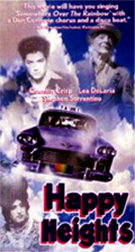 Almost everything in Homo Heights is personal for me. As someone who questions gender and social programming in all its forms, I love mucking about with stereotypes and playing with the notion of what is as opposed to what appears to be—and which is more important! As an actor myself, I also wanted to create fun roles for what turned out to be a genius ensemble. Almost everything in Homo Heights is personal for me. As someone who questions gender and social programming in all its forms, I love mucking about with stereotypes and playing with the notion of what is as opposed to what appears to be—and which is more important! As an actor myself, I also wanted to create fun roles for what turned out to be a genius ensemble.PW: How was Homo Heights released? Did it do the festival circuit or what? Why isn't it better known even in the gay communities? KL: Homo Heights was seen in film festivals around the world. It primarily played the gay film festivals but was also screened at the Seattle International Film Festival and at the Walker Art Center in Minneapolis. Many screenings were to capacity crowds. It did not receive theatrical distribution but is currently being distributed on video and DVD and will be on cable television this year. Blockbuster Video carries the movie under the alternate title Happy Heights. It's a movie that doesn't appeal to everyone—some people find it offensive though I don't quite understand why, maybe they take themselves too seriously? At any rate, without a theatrical distributor to pick up the tab, we could only do a modest amount of publicity during the time it was on the festival circuit. PW: Why did you make this movie? What prompted you to make it? KL: Sara Moore came to me at a time when I was looking for a small film to produce independently. I thought her writing was terrific, her imagination incredible, and encouraged to take the idea and put it into a feature film form. I figured that it could attract an audience and, if we kept the budget down, might even make some money. That hasn't happened but we did make our first feature film—something that is very important to both of our careers. SM: I made Homo Heights in many ways as a response to the idea of a gay community. Sub-cultural in-fighting really interests me and it's quite bombastic in all the many cor 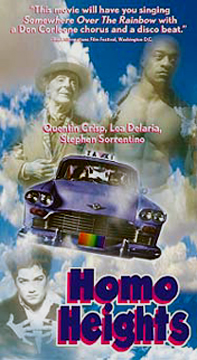 ners of the gay world. On the lighter side, close friends of mine perished in the AIDS crisis of the late 80s and I wanted to make a picture about queer people that was simply funny, if even in a very low-brow way. ners of the gay world. On the lighter side, close friends of mine perished in the AIDS crisis of the late 80s and I wanted to make a picture about queer people that was simply funny, if even in a very low-brow way.PW: Comedy is incredibly difficult to pull off. How did you manage to be so funny? KL: I'm not funny, but then I'm the producer so it doesn't matter. SM: Thank you for laughing. Not everyone does. I've been spit on by militant dykes and had drag queens storm out of the movie on several occasions. Also, snooty festival programmers saying "This is not funny." I'm proud of all incidents! Humor, it seems, is ridiculously subjective. If you thought Homo Heights was funny, come see my solo show at San Francisco's Theatre Rhinoceros in November. It's called Show Ho and in it I "channel" the spirits and personalities of over 50 fringe entertainers! SS: I am a comedian. It's second nature. I believe that there is not a classroom in the world that teaches "funny." People are born funny. |

